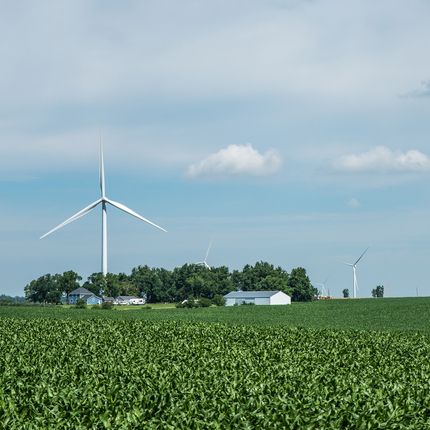The COVID-19 pandemic has not only exposed new challenges for rural Iowans in the past year, it has renewed calls for improved services to ensure a resilient future.
With the introduction of his first bill as an Iowa state representative, Chad Ingels seeks to address one of the many issues surfacing as a result of the pandemic: assistance for new and existing small-scale meat processors.
House File (HF) 857 would create a grant program to assist these processors and a task force to explore the feasibility of establishing an artisanal butchery program at an institution of higher education.
The legislation was among the topics Rep. Ingels addressed as he joined Policy Associate Cody Smith and others earlier this month during the Center for Rural Affairs’ most recent virtual Rural Resiliency Forum.
“We are generally looking at smaller, state-inspected lockers to help build their capacity to not only move product through there, but hopefully at some point, increase opportunity for small farmers to get into private labels so they can sell by the piece,” Rep. Ingels said.
In the days following the forum, the need for such support was evident as HF 857 was unanimously approved by the House. After passing the Appropriations Committee this week in the Iowa Senate, the bill awaits a floor vote there. Last week, Rep. Ingels joined other state lawmakers, small meat processors, and livestock producers in calling on members of the Iowa Senate to vote on the bill.
Meat processors and livestock producers aren’t the only ones who have been challenged by the COVID-19 crisis. When some businesses and schools sent their employees and students home to work and learn in spring 2020, conversations about the lack of reliable broadband service in rural parts of Iowa were renewed.
Rep. Ingels said he’s excited about legislation signed April 28 by Gov. Kim Reynolds that will provide millions of dollars in funding to improve broadband service during the next three years. The improvements could mean a return to rural life for those who have left their home state, he said.
“I personally think people want to move back to rural Iowa,” the representative said. “They found during the pandemic they can spread out a little easier, move a little freer, and do what they want in rural Iowa.”
With broadband improvements, opportunities to work remotely increase, Rep. Ingels said, noting that he recently spoke with a colleague whose daughter interviewed with companies in Chicago, Texas, and Seattle that offered remote work options.
“We need to have the capacity and capabilities to have good broadband across the state,” he said. “I think that’s the best way to grow our state right now.”
The process won’t happen overnight, Rep. Ingels said. Addressing a question from Fayette County Supervisor Janell Bradley, he said officials are working hard to determine how to get the best service they can out to rural parts of the state, but at the same time planning for the future when that service could be improved. The state has received funding from the Coronavirus Aid, Relief, and Economic Security (CARES) Act to help with broadband improvements.
Rep. Ingels believes Iowa’s rural communities will play an important role in the clean energy economy in the future.
Statewide, Iowa’s solar industry employs about 850 people and the wind energy industry employs about 10,000. Last year, about 59% of Iowa’s electricity was produced by renewable wind energy.
“I think rural areas are going to be big in advancing clean energy not only to supply Iowa, but to supply the nation, as well, because we have the wide open spaces,” Rep. Ingels said, adding that wind has provided reliable energy for the state.
He also likes what he’s seeing from solar farms and individual solar investments. With a lot of room to grow, the state needs to find ways to continue that process, he said.
As a former water projects coordinator for Iowa State University Extension and Outreach, Rep. Ingels said he will continue to work on issues related to the state’s water resource challenges, including advocating for the funding of the Natural Resources and Outdoor Recreation Trust, also known as Iowa’s Water and Land Legacy or IWILL. Moving forward with the three-eighths-of a-cent sales tax increase, he said, would provide some significant long-term, sustainable funding to the issue.
“We don’t have the support to do that this session and I’m not sure we will next session,” Rep. Ingels said, “but, we are constantly trying to move that.”
In the meantime, he said, there may be cost-share opportunities that can be explored to address water resource issues. He said he'd like to see if there are ways the state can put funding behind watershed coordinators to make the positions more stable over time and build relationships with farmers so they are comfortable with the changes that need to be made.
In addition to answering questions on meat processing, rural broadband, renewable energy, and water resources, Rep. Ingels heard concerns from Oelwein Mayor Brett DeVore and Councilman Warren Fisk and other forum attendees about declining population in rural areas and the lack of affordable housing in rural communities.
In closing the forum, Rep. Ingels encouraged Iowans to reach out to him with questions and concerns.
“I’m learning something new every day here at the Capitol,” he said. “The more I hear from you, the better questions I can ask of not only fellow legislators, but department officials.”






